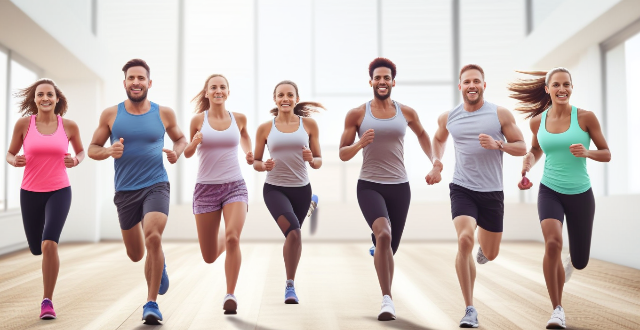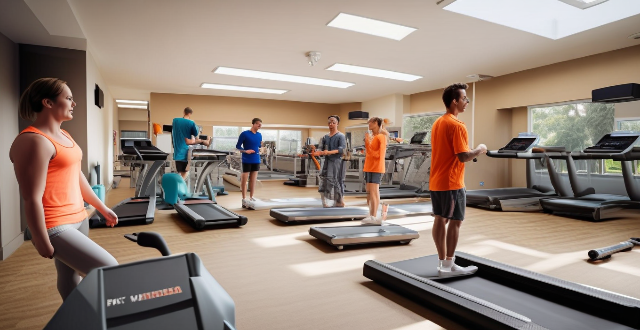Performance Motivation

How does music affect athletic performance ?
Text is about how music can affect athletic performance. It explains the ways in which listening to music while exercising or competing can increase motivation, improve focus, reduce the perception of effort, and distract from pain and fatigue, leading to better performance and results.

What role does visualization play in sports performance ?
Visualization is a powerful tool that can enhance sports performance by improving focus, confidence, technique, recovery, and motivation. It involves creating mental images of desired outcomes or actions, which can lead to better concentration, increased self-efficacy, enhanced motor learning, reduced risk of injuries, and higher levels of motivation. By incorporating visualization into their training routines, athletes can strengthen their physical and mental capabilities, resulting in improved performance during competition and training.

What role does motivation play in educational psychology ?
Motivation is crucial in educational psychology as it influences student engagement and academic performance. It can be intrinsic or extrinsic, with students driven by internal factors like curiosity or external factors like rewards. Understanding theories such as goal orientation and self-determination can help educators foster motivation through strategies like setting clear goals and providing autonomy. Ultimately, creating effective learning environments that inspire students requires a deep understanding of motivation and its impact on education.

How can sport psychology counseling help athletes improve their performance ?
Sport psychology counseling is a specialized field that focuses on the mental and emotional aspects of athletic performance. It aims to enhance an athlete's mindset, motivation, and overall well-being to improve their sporting outcomes. Here's how it can be beneficial: Goal Setting and Motivation: Sport psychologists help athletes set Specific, Measurable, Achievable, Relevant, and Time-bound goals. This clarity in objectives boosts motivation and directs efforts toward improvement. Confidence and Self-Esteem Building: Coaching athletes to replace negative self-talk with positive affirmations enhances their confidence and self-belief. Anxiety and Stress Management: Techniques like deep breathing, progressive muscle relaxation, and mindfulness can reduce anxiety levels before and during competitions. Focus and Concentration: Improving an athlete's ability to focus on relevant cues and block out distractions is crucial for peak performance. Team Dynamics and Interpersonal Skills: Enhancing communication within teams fosters better cooperation and understanding among athletes. Mental Toughness and Resilience: By preparing mentally for setbacks, athletes learn resilience and are better equipped to handle difficulties when they arise. Recovery and Balance: Adequate rest is essential for physical recovery and maintaining mental sharpness. Sport psychologists can guide effective strategies. Helping athletes achieve a balance between their sport and personal lives prevents burnout and keeps them motivated.

What is the relationship between self-efficacy and motivation in learning ?
This article explores the relationship between self-efficacy and motivation in learning. It explains how self-efficacy affects motivation, including choice of activities, level of effort and persistence, and emotional response to setbacks. The article also provides suggestions for enhancing self-efficacy to increase motivation, such as providing opportunities for mastery experiences, modeling successful performance, offering positive feedback and encouragement, and helping students set realistic goals.

How can I increase my motivation to study ?
Motivation is crucial for success in education, but staying motivated can be challenging. To increase your motivation to study, set clear goals, create a study plan, find a study group or partner, stay positive, and reward yourself for meeting goals.

What are the benefits of setting goals for studying and how do they impact motivation ?
The benefits of setting goals for studying include increased clarity and direction, improved motivation through short-term milestones and visual progress tracking, better time management with efficient planning and reduced procrastination, enhanced performance via targeted learning and a feedback loop, and stress reduction due to predictability and a sense of control. These advantages collectively contribute to heightened motivation, both immediately and in the long term, making goal setting an essential strategy for effective and enjoyable learning.

What role does intrinsic motivation play in learning and how can I cultivate it ?
Intrinsic motivation is a key factor in enhancing the learning process. It leads to increased engagement, persistence, and deeper understanding of material. To foster this type of motivation, one should focus on promoting autonomy, competence, relatedness, personal interest, and a mastery orientation. Strategies include offering choices, providing clear feedback, building community, connecting to interests, and emphasizing the learning journey over just the outcome.

What role does gamification play in improving student motivation and learning outcomes ?
Gamification is a growing trend in education that involves incorporating game-like elements into learning activities. It aims to increase student motivation and engagement, leading to improved learning outcomes. Gamification can enhance student motivation by providing rewards and recognition, immediate feedback, and a fun and engaging experience. It can also improve learning outcomes by enhancing cognitive skills, increasing retention and recall, and promoting collaborative learning. To effectively implement gamification in education, educators should consider clear objectives, adaptive challenge levels, balanced competition and collaboration, regular updates, and integration with other teaching methods.

How does music influence motivation during physical activity ?
Music has a significant impact on motivation during physical activity. Fast-paced music increases energy levels, slow-paced music promotes relaxation, and enjoyable music enhances mood. Music can also distract from pain and fatigue, and personal preference plays a role in its effectiveness. Incorporating music into workout routines can make exercise more enjoyable and lead to better results.

How can parents encourage and support their children's academic motivation ?
Academic motivation is a crucial factor in a child's educational journey. Here are some tips on how parents can encourage and support their children's academic motivation: 1. Set goals and expectations by discussing interests and strengths, creating a plan, and providing regular feedback. 2. Create a conducive learning environment by providing a quiet study space, minimizing distractions, and encouraging breaks and physical activity. 3. Offer encouragement and praise by acknowledging efforts and achievements, praising hard work and dedication, and celebrating successes. 4. Be involved in their education by attending parent-teacher conferences, showing interest in their studies, and helping with homework when needed. 5. Model good study habits by demonstrating a positive attitude towards learning, practicing time management and organization skills, and showing perseverance and resilience when faced with challenges.

How does a strong emphasis on athletics affect student performance in other subjects ?
The text discusses the various ways in which a strong emphasis on athletics can influence academic achievements, considering factors such as time allocation, mental health, motivation, and social dynamics. While it can present challenges such as reduced study time and increased stress, it also offers benefits like improved time management and enhanced motivation. Schools and educators should strive to create a balanced environment where both athletics and academics are supported, ensuring that students can excel in all aspects of their education.

Can watching sports movies improve your athletic performance ?
**Can Watching Sports Movies Improve Your Athletic Performance?** *Watching sports movies can provide motivation, teach techniques, and emphasize the importance of sportsmanship and teamwork. While they won't directly enhance performance, they can inspire consistent practice and hard work.*

How has wearable technology impacted sports performance ?
Wearable technology has significantly impacted sports performance by improving training efficiency, enhancing recovery time, and increasing motivation and accountability. Devices such as GPS trackers, heart rate monitors, sleep trackers, and muscle recovery monitors provide athletes with real-time data and insights into their performance, allowing them to optimize their training intensity, prevent overexertion, and reduce the risk of injury. Additionally, fitness trackers and virtual coaching apps help athletes set goals, monitor progress, and stay motivated throughout their training journey. As technology continues to advance, we can expect more innovative solutions that will further enhance sports performance.

Can wearable technology improve athletic performance ?
The text discusses the potential benefits of wearable technology for athletes. Wearable devices can provide real-time feedback, goal setting and tracking, motivation, injury prevention, and data analysis to improve athletic performance. However, they should not replace traditional training methods or professional coaching. Athletes should use them as a tool to complement their existing training program and consult with experts when making decisions about their training and performance goals.

What factors contribute to a decrease in motivation to learn and how can they be addressed ?
Motivation to learn can be affected by a variety of factors, including lack of interest or passion, external pressures, emotional state, physical condition, teaching methods, and expectations/feedback. To counteract these influences, strategies such as cultivating interest, managing stress, supporting emotional well-being, addressing physical needs, enhancing teaching techniques, and setting realistic goals are recommended. By understanding and proactively addressing these factors, both educators and learners can work together to enhance motivation, leading to more productive and satisfying learning experiences.

What is sports psychology and how does it impact athletic performance ?
Sports psychology is a specialized branch of psychology that focuses on how psychological factors influence athletic performance. It encompasses the study of athletes' motivation, mental preparation, concentration, confidence, team dynamics, and the psychological aspects of injury and recovery. By understanding these elements, sports psychologists help athletes enhance their performance, cope with stress, and achieve peak mental states for competition. The key areas of sports psychology include motivation, mental preparation, concentration, confidence, team dynamics, and injury and recovery. Motivation involves intrinsic and extrinsic motivation, as well as goal setting to improve focus and commitment. Mental preparation includes visualization and imagery, self-talk, and flow state. Concentration involves focus management and ignoring distractions. Confidence includes self-efficacy and mental toughness. Team dynamics involve group cohesion and role acceptance. Injury and recovery involve coping strategies for dealing with the emotional impact of injuries and maintaining motivation and positive mindset during rehabilitation. The impact of sports psychology on athletic performance is multifaceted, including enhanced performance through improved focus and increased resilience, mental health benefits such as stress reduction and boosted self-esteem, and team synergy through better communication and coping with pressure. Overall, integrating sports psychology into training regimes can help athletes cultivate the mental fortitude needed to reach their full potential and enjoy a healthier sporting lifestyle.

What role does mental preparation play in improving running performance ?
Mental preparation is key to improving running performance. It involves setting clear goals, using visualization techniques, practicing mindfulness exercises, and employing self-talk strategies. By training the mind to focus on the task at hand, manage stress, and maintain motivation, runners can enhance their physical performance and achieve their running goals.

How do psychological factors influence sports performance and research ?
This document discusses the influence of psychological factors on sports performance, emphasizing the importance of motivation, confidence, concentration, resilience, and team dynamics. It highlights how these elements can enhance or hinder athletic performance and underscores the significance of research in understanding and applying psychological principles to optimize athlete mental states. The text concludes by noting the potential for ongoing research to refine our comprehension and application of psychology in sports, aiming to help athletes achieve their full potential mentally and physically.

Is there a correlation between sports participation and academic performance ?
The article explores the correlation between sports participation and academic performance. It highlights the potential benefits, such as improved time management skills, increased motivation and discipline, and enhanced social skills, but also acknowledges the potential drawbacks, including time constraints, fatigue, pressure, and stress. The conclusion emphasizes the importance of finding a balance between sports commitments and academic responsibilities for optimal performance in both areas.

Do different genres of music have varying effects on sports performance ?
Music is a powerful tool that can influence our mood, motivation, and overall performance in various activities, including sports. The question arises: do different genres of music have varying effects on sports performance? Let's delve into this topic to find out. ### Motivational Aspect - **Upbeat Music**: Fast-paced music with a high tempo, such as rock or electronic dance music, can increase energy levels and provide motivation during workouts or competitions. - **Relaxing Music**: Slow-tempo music like classical or instrumental tracks may help athletes relax and focus on their technique rather than intensity. ### Physical Response - **Heart Rate**: Upbeat music can increase heart rate, preparing the body for more intense physical activity. - **Muscle Response**: Some studies suggest that certain genres of music can affect muscle activation and coordination. ### Mental Focus - **Concentration**: Music without lyrics or with less distracting elements can help maintain focus during repetitive tasks or endurance events. - **Mental Toughness**: Aggressive or empowering music can boost mental toughness, helping athletes push through difficult moments. ### Recovery Process - **Relaxation**: Genres like ambient or yoga music can aid in recovery by reducing stress and promoting relaxation post-exercise. ### Genre-Specific Effects - **Rock/Pop**: Ideal for high-intensity workouts where an energy boost is needed. - **Classical/Instrumental**: Suitable for activities requiring precision and concentration. - **Hip-Hop/Rap**: The strong beats can serve as a rhythmic guide for exercises requiring timing and coordination. - **Electronic Dance Music (EDM)**: Suitable for interval training due to its ability to sustain high energy levels. - **Ambient/Yoga Music**: Helpful in recovery sessions by promoting relaxation and reducing tension.

Can reading about sports help improve one's own athletic performance ?
Reading about sports can enhance athletic performance by providing insights into techniques, strategies, and mental approaches. It helps in technique improvement, mental preparation, and injury prevention. To apply this knowledge, set clear goals, choose relevant resources, practice what you learn, and seek feedback for adjustments.

What benefits can individual athletes gain from tracking and analyzing their performance data ?
Individual athletes can gain numerous benefits from tracking and analyzing their performance data, including improved performance, increased motivation, greater self-awareness, better injury prevention, and more effective recovery strategies. By monitoring their progress, identifying areas for improvement, and making data-driven decisions about their training and competition strategies, athletes can enhance their overall performance and achieve better results.

How does lack of sleep impact athletic performance ?
The text discusses the importance of sleep for athletes, explaining that adequate sleep is essential for muscle recovery and repair, cognitive function, and regulation of energy levels. Lack of sleep can negatively impact athletic performance by decreasing endurance, impairing reaction time and coordination, increasing the risk of injury, altering mood and mental health, and reducing motivation and focus during training or competition. The article concludes that prioritizing sleep as part of an athlete's overall training regimen is crucial for optimal performance.

What is the relationship between sleep and athletic performance ?
The relationship between sleep and athletic performance is crucial, as adequate sleep is essential for athletes to perform at their best both physically and mentally. During sleep, the body undergoes recovery and repair processes, including muscle growth and repair and immune system functioning. Sleep also plays a vital role in maintaining mental health and cognitive functioning, such as concentration and focus and mood regulation. Additionally, sleep is crucial for maintaining energy levels and endurance, particularly for endurance athletes. However, sleep deprivation can have several negative effects on an athlete's performance, including decreased reaction time, impaired coordination, reduced endurance, increased perceived exertion, and altered perception. Therefore, it is essential for athletes to prioritize their sleep and ensure they get enough restful sleep each night to maximize their athletic performance.

What are the best ways to enhance athletic performance ?
Improving athletic performance involves a combination of physical, mental, and lifestyle factors. Here are some strategies that can help athletes reach their full potential: ## Physical Training ### Strength and Conditioning - Incorporating weight training helps build muscle strength and endurance. - Plyometrics exercises like box jumps and bounding improve power output, crucial for many sports. ### Technique and Drills - Perfect practice makes perfect; focusing on the quality of movements rather than just quantity. - Practicing game scenarios can enhance decision-making skills under pressure. ### Recovery - Light activities like walking or swimming can aid recovery. - Stretching and foam rolling help reduce muscle soreness and improve flexibility. ## Nutrition and Hydration ### Diet - Consuming a mix of proteins, carbohydrates, and healthy fats supports energy levels and recovery. - Drinking enough water is essential for maintaining performance and preventing cramps. ### Supplementation (When Needed) - Sports drinks during prolonged exercise can replenish electrolytes and provide energy. - Post-workout protein shakes can aid in muscle repair. ## Mental Preparation ### Visualization - Seeing yourself succeed in your mind's eye can boost confidence and focus. - Setting clear, achievable goals provides direction and motivation. ### Mindfulness and Stress Management - Meditation can reduce anxiety and improve concentration. - Controlled breathing can lower stress levels before and during competition. ## Lifestyle Habits ### Sleep - Athletes need adequate rest to recover physically and mentally. - Maintaining a consistent sleep schedule optimizes rest. ### Avoiding Negative Habits - Substances can impair judgment and harm performance. - High stress levels can negatively impact both physical and mental health.

What are the key factors that contribute to high-level sports performance ?
High-level sports performance is determined by a combination of physical prowess, mental strength, tactical acumen, and favorable environmental conditions. Physical factors include strength and conditioning, flexibility and mobility, nutrition and hydration, and rest and recovery. Psychological factors encompass mindset and motivation, confidence and self-belief, mental toughness, and concentration and focus. Tactical factors involve technical skill, game intelligence, adaptability, and teamwork and communication. Environmental factors include training facilities, coaching staff, and support personnel. By addressing each of these factors through dedicated training and support systems, athletes can reach their full potential and achieve excellence in their chosen sport.

What are the most common metrics used in analyzing sports performance ?
Analyzing sports performance is crucial for athletes, coaches, and teams to improve their skills, strategies, and overall performance. There are several metrics used to evaluate different aspects of sports performance, including time-based metrics such as speed and pace; distance-based metrics such as distance covered and displacement; power-based metrics such as peak power and power endurance; technique-based metrics such as form analysis and biomechanical analysis; physiological metrics such as heart rate and VO2 max; and mental metrics such as mental toughness and motivation levels. These metrics can help athletes and coaches identify areas for improvement and develop effective training programs to enhance performance.

How does the pressure of expectations from fans, media, and sponsors influence an athlete's performance at a competitive level ?
The text discusses the influence of expectations from fans, media, and sponsors on athlete performance. It outlines both positive and negative impacts of these expectations. Fan expectations can motivate athletes and boost their confidence but can also cause anxiety and distractions. Media expectations increase publicity and accountability but may lead to overwhelming pressure and misrepresentation. Sponsor expectations provide financial support and brand alignment opportunities but can result in contractual pressures and distractions. Overall, managing these external pressures effectively is crucial for athletes to maintain optimal performance levels.

What role does genetics play in determining an individual's potential for elite sports performance ?
Genetics plays a significant role in determining an individual's potential for elite sports performance. Physical attributes, physiological characteristics, and psychological traits all contribute to success in sports. Height and body build, muscle composition and fiber type, oxygen uptake and energy production, recovery and injury resistance, motivation and mental toughness, and cognitive abilities are all influenced by genetics. However, environmental factors such as training, nutrition, and coaching also play a crucial role in an athlete's development and success.